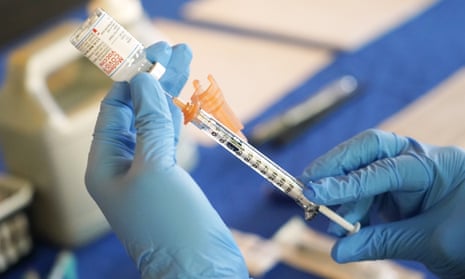A vaccine designed to target two different forms of Covid has been approved by the UK regulator for use as booster jabs in people over the age of 18.
Manufactured by the US firm Moderna, the vaccine targets not only the original coronavirus – as is the case for vaccines currently in use – but is designed specifically to target the Omicron variant BA.1, which fuelled a wave of Covid in the UK last winter.
The UK is the first country to approve the bivalent vaccine, known as “Spikevax bivalent Original/Omicron”.
It is now up to the UK’s Joint Committee on Vaccination and Immunisation (JCVI) to decide whether it will, as expected, be used in the planned autumn booster programme, expected to begin in September.
Dr June Raine, the Medicines and Healthcare products Regulatory Agency (MHRA) chief executive, said: “I am pleased to announce the approval of the Moderna bivalent booster vaccine, which was found in the clinical trial to provide a strong immune response against the Omicron BA.1 variant as well as the original 2020 strain.
“The first generation of Covid-19 vaccines being used in the UK continue to provide important protection against the disease and save lives. What this bivalent vaccine gives us is a sharpened tool in our armoury to help protect us against this disease as the virus continues to evolve.
“We have in place a comprehensive safety surveillance strategy for monitoring the safety of all UK-approved Covid-19 vaccines and this will include the vaccine approved today.”
Prof Sir Munir Pirmohamed, the chair of the Commission on Human Medicines, which independently reviewed the vaccine data, said the commission agreed with the MHRA’s decision.
“The virus, Sars-CoV-2, is continually evolving in order to evade the immunity provided by vaccines. This novel bivalent vaccine represents the next step in the development of vaccines to combat the virus, with its ability to lead to a broader immune response than the original vaccine,” he said.
The MHRA said an exploratory analysis of the bivalent vaccine had shown it generated a good immune response against the Omicron subvariants BA.4 and BA.5. According to Moderna, trial participants who were given the booster had antibody levels against these subvariants that were 1.69 times higher than those given the original booster.
BA.4 and BA.5 fuelled the most recent Covid wave in the UK, and have caused infections, breakthrough reinfections, deaths and disruption around the world.
But Danny Altmann, a professor of immunology at Imperial College London, suggested the vaccine may not offer huge gains in the fight against these subvariants.
after newsletter promotion
“This is a really difficult juncture for all policymakers in terms of vaccine booster procurement and booster programmes,” he said.
“We lack the certainties we had in early 2020 of which way to go with the vaccines, not least, how to keep up with evolution of the variants. BA.5 is highly immune evasive so that even boosted people have highly impaired protection. Even exposure to the original Omicron sequence – as used in this, new, bivalent vaccine booster – only gives a rather marginal advantage to the antibody response.”
He said that meant the outlook was complex. “We’re in a terribly vulnerable position heading into the winter, so any booster programme is better than nothing, and this bivalent booster almost certainly an improvement over the first-generation vaccines.
“My view is that this approach offers a marginal improvement in our battle against BA.5, but actually, we still need to think harder about this and look more broadly at the diverse vaccine candidates. In the meantime, get boosted.”
